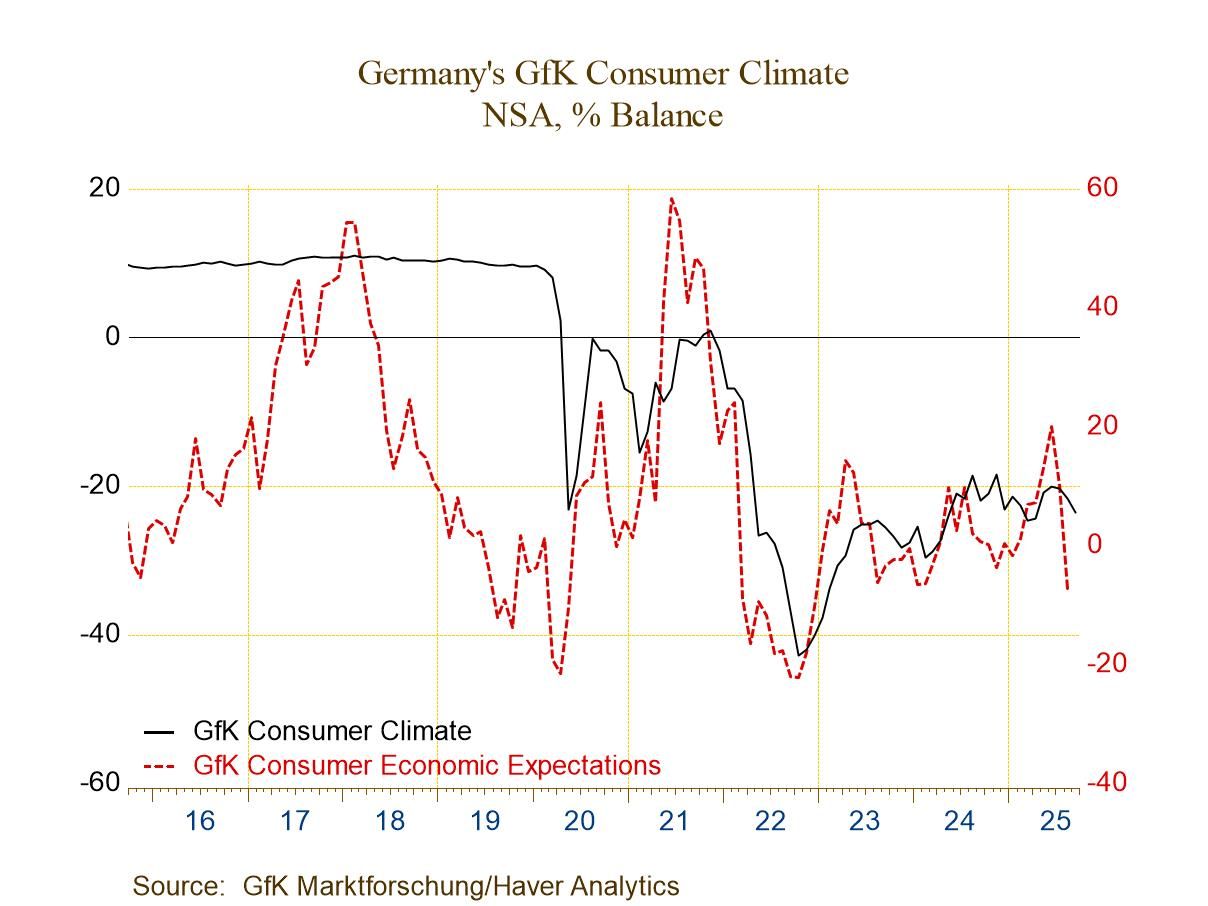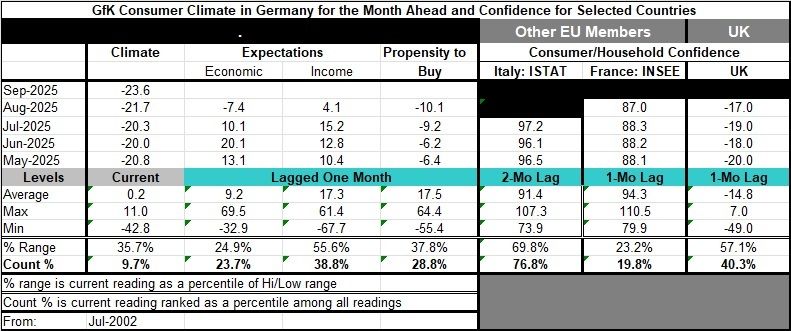German Climate Stabilizes But Eco-expectations Plunge

The GfK consumer climate indicator for Germany slipped in September to -23.6 from -21.7 in August. The slippage brings the index to its weakest level since April 2025 and in fact it's the weakest reading since May 2024 with only two-monthly exceptions.
The components for the GfK index are up to date through August. The economic index in August fell to -7.4, its weakest reading since December 2022. The decline in August was both sharp and deep. Income expectations backed-off; after a reading of 15.2 in July, the index fell to 4.1 in August and was last weaker in March 2025. The propensity to buy index weakened again for the second month in a row to -10.1 in August from -9.2 in July; it's the weakest reading since February 2025.
Percentile standings The percentile standing for the climate index and its components show climate is still very weak at a 9.7 percentile standing among data back to mid-2002. Economic expectations have a 23.7 percentile standing, the propensity to buy has a 28.8 percentile standing, while income expectations have a 38.8 percentile standing. These count percentiles or queue percentiles however you like to think of them, are all quite weak. The median in terms of this sort of gauge occurs at the 50th percentile reading, so all of these readings are well below their historic medians and data back to mid-2002.
Consumer confidence – selected other Europe Other European confidence measures are up to date through August in France where the INSEE confidence measure slipped to 87 from 88.3 while in the United Kingdom the confidence measure improved to -17 in August from -19 in July. Italy's confidence reading is up to date only through July, and on that timeline, it showed a one-month improvement to 97.2, up from June’s 96.1. Italian confidence has the strongest standing at a 76.8 percentile standing, the U.K. has a 40.3 percentile standing, while France has a 19.8 percentile standing. There's a good deal of variation in how consumers perceive current circumstances. Based on these standings, Germany has the lowest assessment in the its lower 10 percentile, while Italy sees a top 25 percentile standing, the U.K. sees an assessment that's about 10 percentile points below its median, while France is at its 20th percentile closer to the German metric in standing. It's a substantial variation especially since three of these countries are in the European Monetary Union.

On balance, consumers are concerned about global economic conditions. The tariff situation is in flux and beginning to settle into a hardened pattern. The Russia-Ukraine war is undergoing attempts to stop it, but neither participant seems willing to accept the conditions that the other requires for either a ceasefire or cessation of hostilities. Russia is increasingly looking as if it is beleaguered and under pressure as the U.S. seems to be edging closer to providing more support to Ukraine. Conditions in the Middle East remained as entangled and hostile as ever. Globally inflation continues to hover slightly above central banks’ targets in most places although it does not show much sign of drifting higher or lower as economic conditions continue to be weak. The Federal Reserve appears to be flirting more with the prospects of rate cuts, as the president mounts efforts to try to exert his influence or even outright control over the central bank. This is something that is going to bear some close watching.
Robert Brusca
AuthorMore in Author Profile »Robert A. Brusca is Chief Economist of Fact and Opinion Economics, a consulting firm he founded in Manhattan. He has been an economist on Wall Street for over 25 years. He has visited central banking and large institutional clients in over 30 countries in his career as an economist. Mr. Brusca was a Divisional Research Chief at the Federal Reserve Bank of NY (Chief of the International Financial markets Division), a Fed Watcher at Irving Trust and Chief Economist at Nikko Securities International. He is widely quoted and appears in various media. Mr. Brusca holds an MA and Ph.D. in economics from Michigan State University and a BA in Economics from the University of Michigan. His research pursues his strong interests in non aligned policy economics as well as international economics. FAO Economics’ research targets investors to assist them in making better investment decisions in stocks, bonds and in a variety of international assets. The company does not manage money and has no conflicts in giving economic advice.
More Economy in Brief
 Global| Feb 05 2026
Global| Feb 05 2026Charts of the Week: Balanced Policy, Resilient Data and AI Narratives
by:Andrew Cates






